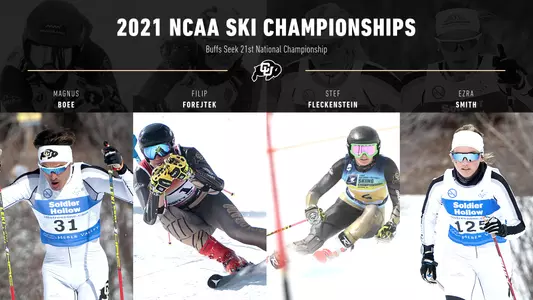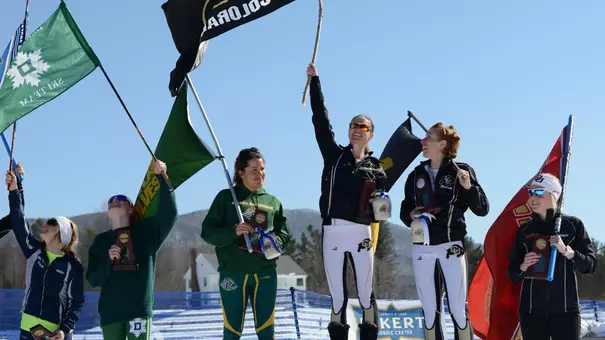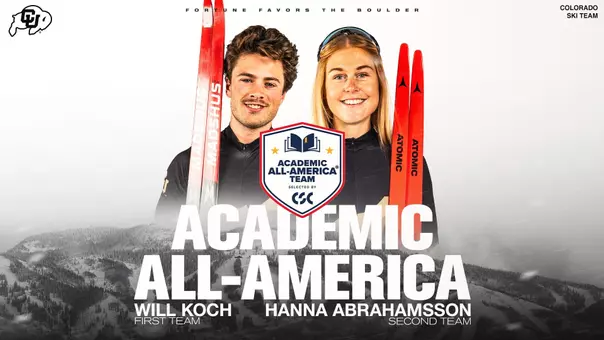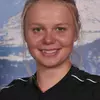Colorado University Athletics

Buffs Primed For Run At 21st National Championship
March 08, 2021 | Skiing
FRANCONIA & JACKSON, N.H. – The Colorado Buffaloes Ski Team has ventured east about 2,000 miles to New Hampshire, where 12 student-athletes will attempt to bring home the program's 21st National Championship this Wednesday through Saturday at the 68th Annual NCAA Ski Championships.
The 2021 NCAA Championships will mark the end of an era, not just for the Colorado Ski Team but for NCAA Skiing in general, with the impending retirement of CU coach Richard Rokos, who will be leading the Buffaloes on the slopes for the final time attempting to accomplish the same thing his first team back in 1991 did by winning an NCAA Championship.
The schedule for the 2021 championship begins with men's and women's giant slalom races on Wednesday with Nordic getting underway Thursday with 5K women's and 10K men's classic races. The great equalizer, as Rokos puts it, will take place Friday with men's and women's slalom races and the championship will close out on Saturday with the 15K women's and 20K men's freestyle races. Both Nordic races will be interval start races due to the pandemic.
At first glance, Utah looks to be nearly unbeatable, but if all of 2020 and the first few months of 2021 teach us anything, it's that anything can happen. The Utes will be a formidable opponent in 2021 but one key factor about the NCAA Championships puts many teams on a level playing field, you can only bring 12 skiers to compete, three in each gender and discipline (men's and women's alpine and Nordic). That fact also hurts the Buffs, who are leaving behind several skiers who could compete for All-America status, but it likely hurts the Utes more, who are leaving home a few first-team All-RMISA performers due to the rules.
The Buffs' strength in 2021 has been the men's Nordic team, and specifically sophomore Magnus Boee, who has won a CU-record tying eight races in 10 attempts entering the championships. Boee has eight wins, one third and one fourth place finish and aside from tying the overall season record for men's Nordic skiers in CU's illustrious 75 year history, but his four wins in each freestyle and classic also match the CU record.
The men's Nordic team is also boosted by a pair of freshmen in Oyvind Haugan and Will Koch. Haugan has been a staple in the top seven since his first college race and has more often than not finished in the top five. Koch is the top men's Nordic skier in his age group in the United States and has been a constant top 10 threat all season.
On the women's Nordic side, the Buffs have been consistent all season with newcomer Weronika Kaleta, sophomore Anna-Maria Dietze and junior Ezra Smith, who have more often than not finished in succession in races this season, although usually not in the same order. As a group, they have finished in the top 10 a total of 20 times out of 30 possibilities. Each of the three has one top five finish to their credit, as well.
On the alpine side, the Buffs have been led by the consistently high effort of junior Filip Forejtek on the men's side. Forejtek has finished nine of 10 races and finished in the top six in each of those nine races. He has eight top five finishes with six podium appearances and one race win. Freshman Louis Fausa adds to the men's alpine depth with seven finishes in 10 races and five of those seven in the top 10, and he's coming off his best finish of fourth at the RMISA Championships. The veteran of the entire CU team is also on the men's alpine side with Joey Young, who will be making his 50th start at the championships. Young has had a tough season plagued by a fall in the second race of the season, but in his career he has two race victories and just missed out on two All-America honors in 2019 taking 11th in the GS and 13th in the slalom races.
The women's alpine side may have the most question marks but also potentially has the most potential, led by junior Stef Fleckenstein, who missed the first four races of the season due to injury and returned to finish five of the last six races and never outside the top seven and she finished second in the GS race at the RMISA Championships. Fellow Canadian National Team Member and freshman Cassidy Gray will make her first appearance at the NCAA Championships. She won the only GS race she finished (out of two) this season while competing for Team Canada, and she took 23rd at the World Championships last month in Italy. Sophomore Emma Hammergaard rounds out the women's alpine team. She has seemingly taken a few more risks this season, finishing six of 10 races, but she's finished in the top 10 five times. As a freshman, she finished at a higher rate, 11 of 13 races, but had two fewer top five finishes with three total.
Stakes are always higher at the NCAA Championships, not only because it's the NCAA Championships but because every result counts, unlike any race all season long. Given that fact, it's anybody's game.
This season more than any other there are more teams that could make a run at the championship. With fewer schools in the east competing, that unfortunately leaves traditional powerhouses Dartmouth and Middlebury out of the mix this season, but that also means more schools will be fielding a full 12-skier team like the Buffs.
In the west, aside from Utah and the Buffs, which finished 1-2 in four of the five meets this season, Montana State has also had a solid season, as has Alaska Anchorage. Denver has had a bit of a down year, but the Pioneers always bring everything they have and usually compete for a title at the NCAA Championships. In the east, host New Hampshire will field a full team for the first time in a while and will be skiing on its home courses, which has to be an advantage. Perennial power Vermont is also full steam ahead will a full 12-skier team and was dominant at times in the eastern region this season.
Several other teams will be at full strength in one of the two disciplines, which means they won't compete for the overall title but their performances will certainly come into play with which teams eventually wins the title. Those teams are Boston College (alpine), MIchigan Tech (Nordic), Northern Michigan (Nordic), Plymouth State (alpine) and Westminster (alpine). Specifically watch out for Northern Michigan and Westminster. The Wildcats have finished in the top 10 several times and among the Nordic leaders in recent memory and Westminster, skiing at the NCAA Championships for just the second time, scored the most alpine points in the RMISA throughout the season.
The 2021 NCAA Championships will mark the end of an era, not just for the Colorado Ski Team but for NCAA Skiing in general, with the impending retirement of CU coach Richard Rokos, who will be leading the Buffaloes on the slopes for the final time attempting to accomplish the same thing his first team back in 1991 did by winning an NCAA Championship.
The schedule for the 2021 championship begins with men's and women's giant slalom races on Wednesday with Nordic getting underway Thursday with 5K women's and 10K men's classic races. The great equalizer, as Rokos puts it, will take place Friday with men's and women's slalom races and the championship will close out on Saturday with the 15K women's and 20K men's freestyle races. Both Nordic races will be interval start races due to the pandemic.
At first glance, Utah looks to be nearly unbeatable, but if all of 2020 and the first few months of 2021 teach us anything, it's that anything can happen. The Utes will be a formidable opponent in 2021 but one key factor about the NCAA Championships puts many teams on a level playing field, you can only bring 12 skiers to compete, three in each gender and discipline (men's and women's alpine and Nordic). That fact also hurts the Buffs, who are leaving behind several skiers who could compete for All-America status, but it likely hurts the Utes more, who are leaving home a few first-team All-RMISA performers due to the rules.
The Buffs' strength in 2021 has been the men's Nordic team, and specifically sophomore Magnus Boee, who has won a CU-record tying eight races in 10 attempts entering the championships. Boee has eight wins, one third and one fourth place finish and aside from tying the overall season record for men's Nordic skiers in CU's illustrious 75 year history, but his four wins in each freestyle and classic also match the CU record.
The men's Nordic team is also boosted by a pair of freshmen in Oyvind Haugan and Will Koch. Haugan has been a staple in the top seven since his first college race and has more often than not finished in the top five. Koch is the top men's Nordic skier in his age group in the United States and has been a constant top 10 threat all season.
On the women's Nordic side, the Buffs have been consistent all season with newcomer Weronika Kaleta, sophomore Anna-Maria Dietze and junior Ezra Smith, who have more often than not finished in succession in races this season, although usually not in the same order. As a group, they have finished in the top 10 a total of 20 times out of 30 possibilities. Each of the three has one top five finish to their credit, as well.
On the alpine side, the Buffs have been led by the consistently high effort of junior Filip Forejtek on the men's side. Forejtek has finished nine of 10 races and finished in the top six in each of those nine races. He has eight top five finishes with six podium appearances and one race win. Freshman Louis Fausa adds to the men's alpine depth with seven finishes in 10 races and five of those seven in the top 10, and he's coming off his best finish of fourth at the RMISA Championships. The veteran of the entire CU team is also on the men's alpine side with Joey Young, who will be making his 50th start at the championships. Young has had a tough season plagued by a fall in the second race of the season, but in his career he has two race victories and just missed out on two All-America honors in 2019 taking 11th in the GS and 13th in the slalom races.
The women's alpine side may have the most question marks but also potentially has the most potential, led by junior Stef Fleckenstein, who missed the first four races of the season due to injury and returned to finish five of the last six races and never outside the top seven and she finished second in the GS race at the RMISA Championships. Fellow Canadian National Team Member and freshman Cassidy Gray will make her first appearance at the NCAA Championships. She won the only GS race she finished (out of two) this season while competing for Team Canada, and she took 23rd at the World Championships last month in Italy. Sophomore Emma Hammergaard rounds out the women's alpine team. She has seemingly taken a few more risks this season, finishing six of 10 races, but she's finished in the top 10 five times. As a freshman, she finished at a higher rate, 11 of 13 races, but had two fewer top five finishes with three total.
Stakes are always higher at the NCAA Championships, not only because it's the NCAA Championships but because every result counts, unlike any race all season long. Given that fact, it's anybody's game.
This season more than any other there are more teams that could make a run at the championship. With fewer schools in the east competing, that unfortunately leaves traditional powerhouses Dartmouth and Middlebury out of the mix this season, but that also means more schools will be fielding a full 12-skier team like the Buffs.
In the west, aside from Utah and the Buffs, which finished 1-2 in four of the five meets this season, Montana State has also had a solid season, as has Alaska Anchorage. Denver has had a bit of a down year, but the Pioneers always bring everything they have and usually compete for a title at the NCAA Championships. In the east, host New Hampshire will field a full team for the first time in a while and will be skiing on its home courses, which has to be an advantage. Perennial power Vermont is also full steam ahead will a full 12-skier team and was dominant at times in the eastern region this season.
Several other teams will be at full strength in one of the two disciplines, which means they won't compete for the overall title but their performances will certainly come into play with which teams eventually wins the title. Those teams are Boston College (alpine), MIchigan Tech (Nordic), Northern Michigan (Nordic), Plymouth State (alpine) and Westminster (alpine). Specifically watch out for Northern Michigan and Westminster. The Wildcats have finished in the top 10 several times and among the Nordic leaders in recent memory and Westminster, skiing at the NCAA Championships for just the second time, scored the most alpine points in the RMISA throughout the season.
Players Mentioned
Colorado Ski: Why CU?
Friday, June 27
Colorado Ski: 2025 Facility Tour
Tuesday, June 10
Colorado Ski: 2024-25 Banquet
Tuesday, April 22
2024 Ski Team Season Recap
Tuesday, April 30




















